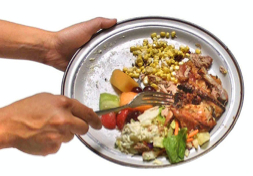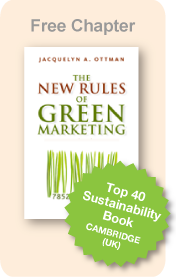Jacquie Ottman's
Green Marketing Blog
Why Consumers Care About Restaurant Food Waste
October 30, 2013 by Jacquelyn Ottman

Thanks to new reports from NRDC and Harvard, indicating that 40 percent of food never makes it from the farm to a table, and that consumers are confused by “sell by” and “best by” dates, food waste is emerging as a big issue. Among the mindful consumers within our We Hate To Waste online community, food waste is now on par with long-standing environmental concerns such as water and energy supplies.
People care about food waste for all kinds of reasons, starting with moral issues such as global hunger, environmental reasons including carbon footprint (food waste decomposes in landfills into methane, a potent greenhouse gas), and even health concerns like obesity.
Despite all the attention traditionally given to leftovers, food scraps, uneaten crusts of bread, our consumers seem to be especially concerned about food waste away from home, and they are willing to take steps to deal with it that have implications for restaurant branding and practices, particularly regarding portion control and choice of doggie bags.
Mindful Consumers Weigh In

We’ve been busy polling the many mindful consumers who visit our WeHateToWaste.com community website and we’ve garnered many insights that suggest that consumers see over-sized portions contributing factor to food waste (not to mention obesity) and seek options in smaller portion sizes and the economic benefits that go with it.
Compounding the issue are the inferiorly designed doggie (‘to-go’) bags that make taking home uneaten food impractical, less desirable, and even wasteful in and of itself because of bulky, often non-recyclable packaging.
What Restaurants Can Do To Prevent Food Waste
Restaurants that can proactively address diners needs have particular opportunities to enhance revenues, profits, and image. For starters, try more flexible portion options (with accompanying pricing) that can broaden appeal to such demographics as seniors, dieters, and women (beyond children who seem to be adequately served now), and reconsider ‘all you can eat’ programs. Make it easy to share restaurant entrees more easily. Offer to pack uneaten food to-go.
Another often overlooked opportunity is to find superior doggie ‘to-go’ bag designs that can accommodate the dual challenges of serving on-the-go lifestyles (not everyone heads straight home after dining), and such environmental and health concerns such as plastic migration and compostability; not surprisingly, styrofoam heads the ‘no-no’ list of materials, among our ardent ‘waste watchers’.

Underscoring the opportunity, our consumers reported that an environmentally preferable option ‘would make them feel better about their restaurant choice,’ even swaying their choice of dining establishment in some instances. Some ardent ‘waste watchers’ would prefer to bring their own containers, volunteering existing behavior using a variety of rigid as well as flexible containers of materials including metal as well as plastic.
To make sure that uneaten food that is packed to go winds up being eaten not tossed, up-to-date doggie bags should accommodate in-home use concerns like microwave-ability and freshness, even including directions for reheating or serving suggestions.
Finally, concerns over “behind the scenes” food waste that are more difficult for diners to monitor suggests the need for more transparent restaurant practices, especially in municipalities with particularly high rates of food that is landfilled.
Our mindful consumers are surprisingly enlightened about optimum solutions to food waste, exhibiting an intuitive understanding of the Food Waste Hierarchy, i.e., making sure that food is first eaten by humans or animals, and then composted, and only landfilled as a last resort. Establishments that can divert uneaten food to local food banks and other causes and can communicate same to patrons have particular opportunities to enhance their brand.
This article was first published on TriplePundit.com October 18, 2013
Jacquelyn Ottman is founder and principal of J. Ottman Consulting, Inc. NYC-based experts on green marketing and eco-innovation. She is the author of The New Rules of Green Marketing: Strategies, Tools, and Inspiration for Sustainable Branding (Berrett-Koehler 2011). Earlier this year, her firm launched WeHateToWaste.com, an online global community of consumers looking to prevent household waste, conserve natural resources and get the most from the products they buy.
Recent Blog Posts
R-R- Redundancy — a New ‘R’ To Heed
New E-Report on What 2012 FTC Green Guides Updates Means for Marketers
How To Make Waste Watching Fun, Easy—and Mainstream



 ShareThis
ShareThis

